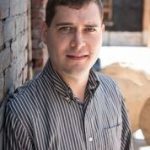Coronavirus. When I first heard the word, it seemed esoteric. Distant. Unthinkable. A virus had been unleashed in another part of the world, but it wasn’t my immediate concern. I vaguely remember the news reports about the Chinese struggle to contain COVID to the Wuhan Province. Since I live in New York City (NYC), I did wonder if the virus could come here, since my adopted hometown is a gateway city, buzzing with international travelers.
Still, I didn’t give the virus much thought, even as it continued to generate headlines. My focus was on my family and the small church I pastor in Brooklyn. In fact, in mid-March we were planning a major community event, focused on bringing Christianity into conversation with the arts. Our goal was to demonstrate that Christians should be patrons of quality art and to connect with the creative class in our neighborhood. With the help of three different mission teams, I was hard at work preparing for the first ever event of the Nostrand Avenue Art Collective.
The same day we celebrated God’s creativity through art, the NBA canceled its season.
Meanwhile, the headlines kept coming. Out on the west coast, churches were shutting down due to an outbreak in Seattle. For the first time, I thought, could that be our future? Closer to home, the virus appeared in New York in a handful of cases. We were assured that everything was under control. No need to worry. Yet the National Guard was setting up a quarantine outside the city, cordoning off one of the suburbs of NYC. That seemed ominous.
This led to jitters, both on my part, and on the part of those serving with me. Our art event began to evolve in unexpected ways as two performers withdrew at the last minute, one citing concerns about contract tracing. On the morning of our event, I met with two teams who had devoted their Spring Break to serve our community. I asked them how they felt about what was going on. I asked the students how their parents back home felt about what was happening. They seemed okay, but nervous.
That night I was surprised by the fantastic turnout for our art event. We mingled with our neighbors as we enjoyed live jazz, played art trivia and gave away a Mako Fujimura print. By all accounts, the event was a huge success. And it was the last public event we would hold for months.
The same day we celebrated God’s creativity through art, the NBA canceled its season. One by one, major cultural and sporting events were canceled. By the end of the week, some members of our church had left the city, headed to other states to wait out the Coronavirus. Since a large percentage of our church had rapidly departed, we knew we needed to provide some digital option for church. Prior to that week, we had not offered virtual solutions to church, preferring instead to focus on physical gathering and embodied worship.
Suddenly, we were faced with a dilemma. Should we push forward with an in-person service this Sunday and provide a livestream, or should we move entirely online? The leadership team at our church plant weighed our options, but we were deciding in the dark. There was no government directive, no guidance from the CDC. I participated in a clergy call with The Mayor’s Office but came away without any firm guidance. On that Saturday, with less than 24 hours before our church service, we decided to suspend our physical gatherings and move our worship services online.
I had to figure out how to live in a city that was suddenly turned upside down.
As a small church plant, this was a staggering challenge. We did not have the technical resources that many larger churches had, and we were in for a crash course in the challenges of virtual church. Additionally, we had no church building to film in. We would be broadcasting songs from the apartment of our worship leader, and sermons from my own apartment. From a technical standpoint, our first virtual service left much to be desired. We had nowhere to go but up.
Within two weeks, NYC went on lockdown. I had to figure out how to live in a city that was suddenly turned upside down. Personally, my wife and I scoured for food and necessities, like toilet paper. With barren shelves at the stores, and people suddenly hoarding what they had, we relied upon friends who sent us non-perishables in the mail. We tried to explain COVID to our two older children, but we didn’t really understand it ourselves. We wondered if it was safe for our little girl to attend the public school two blocks from our apartment. There was so much confusion and uncertainty in these early days.
Little did I know how much life was about to change. In the next installment of The COVID Chronicles, I’ll share how our church plant became a restaurant and how our family coped with COVID on our fire escape.
- Read part 2: “Loving a City in Lockdown“
- Read part 3: “Erupting and Adapting“




Comments and Pingbacks
2021-01-28 15:25:07
Erupting and Adapting | The COVID Chronicles, Part 3 | Intersect
[…] Read part 1: “The Grinding Halt“ […]
2021-01-28 15:25:27
Loving a City in Lockdown | The COVID Chronicles, Part 2 | Intersect
[…] Read part 1: “The Grinding Halt“ […]